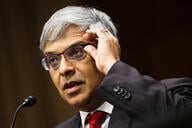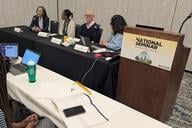You have /5 articles left.
Sign up for a free account or log in.
Eastern Mennonite University announced Saturday that is delaying formal action on rethinking its ban on hiring openly gay professors. The move disappointed those who had advocated for change. But those same critics noted that the university’s decision – which continued a suspension of the hiring policies in question – effectively reverses the ban for the time being and leaves open the door for a more permanent change in the future.
The announcement by Eastern Mennonite comes as several colleges in the denomination are facing unprecedented pressure from their own faculties and students to end discrimination against gay people. Church leaders appear less willing to change their stance that do many on the church's campuses.
"There was a fairly consistent voice from members of the Mennonite Church, many of whom are also [university] stakeholders, that, given the intensity of conversations going on within the denomination about sexuality, we should continue to be engaged with the denomination on this issue,” said Loren Swartzendruber. The university president led the six-month listening period that preceded the Board of Trustees decision, and recommended that the board delay formal action after reviewing some 7,000 surveys from students, faculty, alumni, and others in Harrisonburg, Va., and Mennonite communities. The president and his cabinet also heard feedback at 20 open meetings on the proposal.
Swartzendruber said that although there was no on-campus consensus, a majority of students and faculty members in respectful discussions supported reversing the ban. External voices from parents, alumni and donors – those with a “vested” interest in the university, he said – were more opposed, and tilted the balance in favor of delaying a vote.
A formal reversal would have reportedly been a first for any member institution for the Council for Christian Colleges and Universities, although other Mennonite colleges are having similar conversations about allowing the hiring of openly gay faculty members. CCCU member institutions have statements of faith required of faculty members, but those statements differ among the institutions, which represent a variety of denominations and beliefs.
Discussions on Mennonite campuses reflect ongoing debate within the Mennonite Church itself. Because the denomination has a strong focus on social justice issues, many members view its non-recognition of same-sex marriage as incompatible with its identity as a whole. Others still believe strongly and exclusively in the biblical definition of marriage: a union between a man and woman.
Mark Sawin, an Eastern Mennonite professor of history who supported a full reversal, said via email that the announcement came as a “disappointment,” but is “understandable and I’m grateful that the board will continue to suspend any action against faculty or staff in same-sex relationships while the church continues to debate this contentious issue.”
Saying he was speaking for himself and not the institution, Sawin continued: “I hope this process can continue in love, but in the meantime, I grieve for my brothers and sisters who remain excluded. They are just as faithful and just as concerned about our church, and they deserve to be accepted, not kept outside.”
Darian Harnish, a recent graduate who was a co-founder of the university’s Safe Space program for gay, lesbian, bisexual and transgender students, said that the board’s “unwillingness to rock the boat or take a stand shows cowardice and a lack of real leadership.” He said that in delaying any decision, the board also failed to capitalize on current, “positive momentum” regarding gay rights, such as the recent U.S. Supreme Court decisions in favor of same-sex marriage.
But Harnish said he was choosing to be “optimistic” that the decision means progress at Eastern Mennonite nonetheless.
“The board did effectively change their policy, and that’s noted in the official statement,” he said, referring to what he saw as the board’s intentional use of the word “formally” to qualify its deferral.
The full statement reads: “We reaffirm EMU’s mission — to prepare students to serve and lead in a diverse global society — and EMU’s role as a university that fully engages the difficult questions of our time and welcomes diverse perspectives and experiences into the conversation. Out of respect for EMU’s relationship with Mennonite Church USA and its ongoing discernment of human sexuality, we defer action on formally changing EMU’s policy on hiring employees in covenanted same-sex relationships. The November 2013 board decision to suspend personnel actions related to the current hiring policy will remain in effect as the discernment process continues.”
In the fall, Eastern Mennonite announced that it was planning a six-month listening period on possibly reversing hiring policies that amount to a ban on non-celibate gay faculty members.
During the interview process, candidates have to disclose any objections they have to the Mennonite Church’s Confessions of Faith in a Mennonite Perspective, which defines marriage as a covenant for life between a man and a woman. Upon hire, faculty members also have to sign the university’s Community Lifestyle Commitment condemning premarital sex (same-sex marriages are not recognized by the state of Virginia).
Those policies were suspended during the listening period, and continue to be suspended, according to Saturday’s vote. Swartzendruber said that because the university has stopped asking faculty members about marriage between a man and a woman, he doesn’t know if the university has hired any non-celibate gay professors. (Even under the proposed reversal, same-sex sexual acts must still take place within the context of a lifelong “covenant,” as is expected of heterosexual faculty members.)
During the listening period at Eastern Mennonite, Goshen College in Indiana and Kansas’s Bethel College, both Mennonite institutions, also saw pushback on their policies regarding gay faculty and staff.
The debate at Goshen, which is Eastern Mennonite’s sister institution and which has a similar stance on gay faculty and staff, came to a head in May when a library services assistant publicly resigned. She said she had gotten engaged to a woman and could no longer bear “[l]iving every day in the hypocrisy of being true to myself and [Goshen’s] hiring policy.”
Tabi Berkey’s letter of resignation, posted to Facebook, says: “I am writing this letter because I believe in the college’s commitment to the core values, specifically compassion, openness to other cultures, and being centered in Christ’s values.”
It continues: "I am leaving this campus with a heavy heart, but a hopeful one. Perhaps this will be the final straw that causes permanent change here.”
Jodi Beyeler, a Goshen spokeswoman, said via email that the college was “grateful” to Berkey for bringing to light an ongoing discussion at Goshen and in the Mennonite church more broadly.
“This specific conversation about whether we will change our hiring practices was happening long before [Berkey’s] resignation and continues at all levels,” Beyeler said. “The Goshen College Board of Directors stands in solidarity with deliberative processes under way in the broader Mennonite church related to this and will continue its own discernment process at future meetings in the context of these dialogues.”
Unlike Goshen and Eastern Mennonite, a third Mennonite college does not require faculty and staff to adhere to a lifestyle commitment. Recently however, the faculty at Bethel College felt there was a need to bring its nondiscrimination policy more in line with its hiring policy. They voted -- followed by the Board of Trustees – to add language about sexual orientation to the policies.
Dwight Krehbiel, a professor of psychology at Bethel who helped develop the motion, said via email that the revision was prompted by a general interest in updating the decade-old policies, rather than any specific case of the college not hiring a gay faculty member.
He added: “I don't think we have been opposed to hiring non-celibate gay faculty in the past, and I think this statement affirms that policy. Thus, I'm not sure that the new statement has any immediate practical consequences except that we have been somewhat sensitized to the importance of the issue and are more unified in our approach than we were, since the statement was passed with a very large majority vote.”
Krehbiel said students also seemed supportive of the action.
A Bethel spokeswoman said only that it has always been the college’s policy to hire the “best candidate” for a position.
Leading up to the Eastern Mennonite decision, some have speculated that a decision in favor of reversing the ban could jeopardize the college’s place in the Christian college council. The council has said it does not closely track institutions' hiring policies regarding gay faculty members, but Christianity Today reported that Eastern Mennonite's reversal would have been the first for a member institution.
Leaders from the Christian college council had no immediate comment on Saturday's announcement.
In a news release from Eastern Mennonite announcing the decision, Carlos Romero, executive director of the Mennonite Education Agency, said, the listening process “was consistent with how the church engages in discernment around difficult issues.”





